The SEO Jobs Report
Written by Brian Dean
We analyzed 7,051 job postings on Glassdoor and LinkedIn to better understand the current SEO job market.
In this new report you’ll learn:
- Average SEO position salaries
- Skills that employers look for
- How COVID-19 impacted SEO job demand
- Industries that hire the most SEOs
- Lots more
Let’s dive right into our findings.
Highlights and Key Findings:
1. The mean salary for a US-based SEO professional is $60,548 per year.
2. Companies based in CA, CT, NY and NJ pay the highest annual salaries for SEO pros (mean salary of $72.6k/year). Those located in UT, PA and IL pay the least (mean salary of $48.7k/year).
3. SEOs that know how to code get paid more than those that don’t. Specifically, SEO job postings that require knowledge of a specific programming language have a 7.3% media higher salary compared to similar job postings without a programming language requirement.
4. Companies hiring for SEO talent post job titles that contain the terms “Senior SEO manager”, “Head of SEO”, “SEO content writer”, “SEO account manager” and “Marketing manager SEO”, and “SEO digital marketing”.
5. Only 22.9% of SEO job postings are for technical positions (for example, “SEO analyst”). The vast majority (77.1%) are looking for SEO professionals with non-technical skills, like “SEO strategist”.
6. Cities that recruit the highest number of SEO professionals include New York, San Francisco, Austin, Chicago, Atlanta and LA.
7. The most common skills that recruiters look for in an SEO include “marketing”, “content”, “search”, “analytics”, “data” and “tools”.
8. The industries that are most interested in filling SEO positions are: Advertising & Marketing, Staffing & Outsourcing, Internet, IT, Publishing, and Enterprise Software.
9. 29.8% of SEO positions require a bachelor’s degree. Only 7% require a master’s degree. And 64.3% don’t have any degree requirements at all.
10. The most common programming languages required by companies hiring SEO help are HTML, CSS, Javascript, Go, SQL and PHP.
11. The COVID-19 pandemic didn’t slow down the number of SEO job postings. In fact, postings for SEO positions seemed to slightly increase during the height of the crisis.
12. 63.4% of SEO jobs require experience with a specific tool. The most common tools that employers cite are Google Analytics, Semrush, Google Search Console, Moz and Screaming Frog.
The Average SEO Annual Salary is $60,548/Year. Although Salary Varies Significantly By City and State
We used Glassdoor.com to find and analyze salary data for SEO job postings in the United States.
We discovered that the mean annual salary for an SEO position is $60,548.
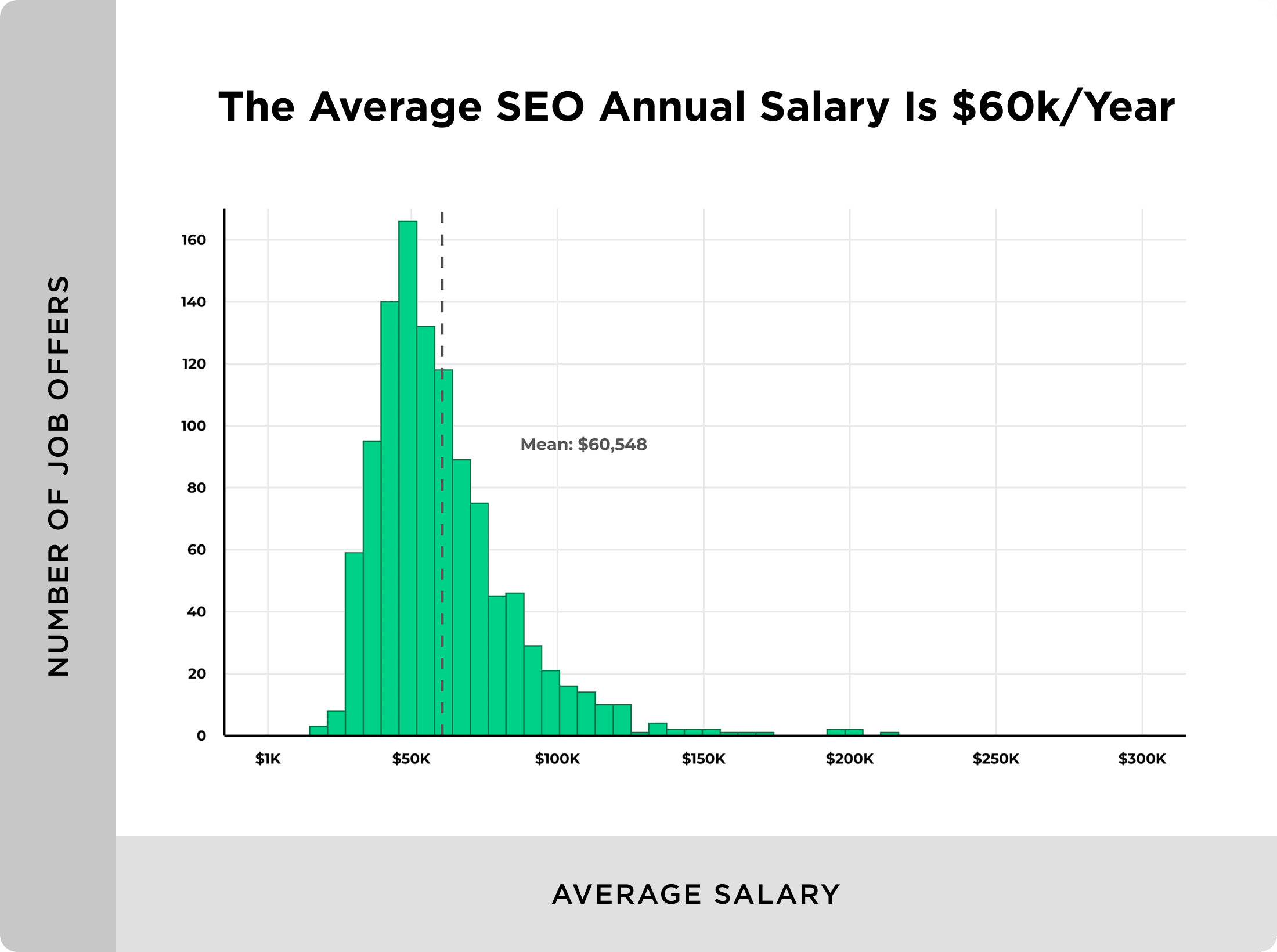
However, this figure varies significantly based on a number of different factors. Namely, the city and state where the company is located.
First, we broke down the average SEO salary by city. Here’s the full breakdown.
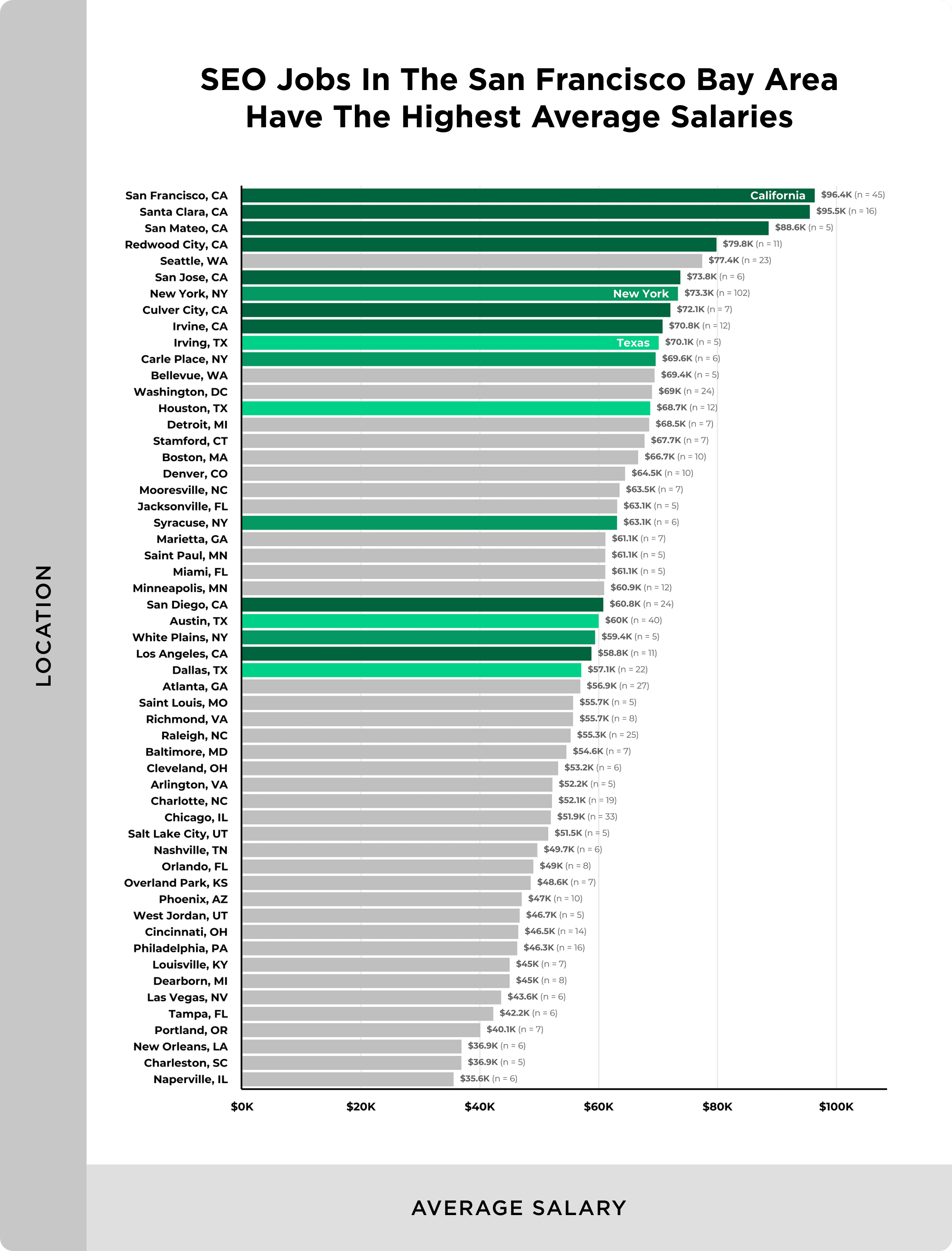
Perhaps not surprisingly, SEO jobs in the San Francisco Bay Area pay by far the most.
Research by Deutsche Bank discovered that San Francisco is the US city with the highest salary across all professions. And this seems to apply to careers in the SEO field.
In fact, the average SEO job salary in San Francisco is 2.64x higher than similar positions based in Naperville, Charleston, and New Orleans.
We ran the same salary analysis by state.
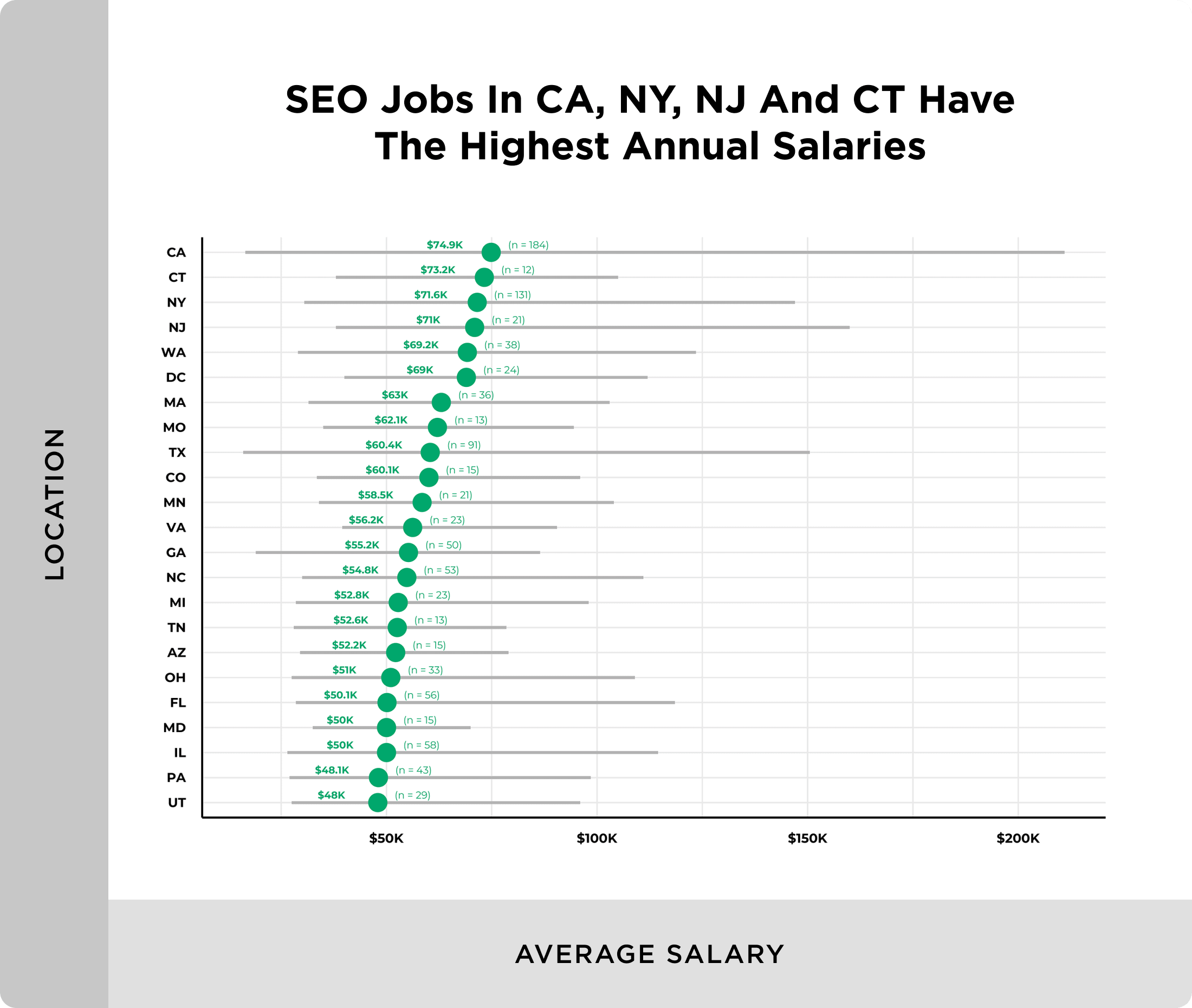
Again, California-based companies pay the most for SEO help. With Northeast states located in and around New York not far behind.
On the other end of the spectrum, Utah, Pennsylvania and Illinois came out towards the bottom of the list.
SEOs That Can Code Get Paid More Than Those That Can’t
Speaking of salaries, we found a slight connection between coding requirements and higher salaries.
Specifically, we found that SEO jobs that require coding skills have a 7.3% higher median salary vs those that don’t require web development skills.
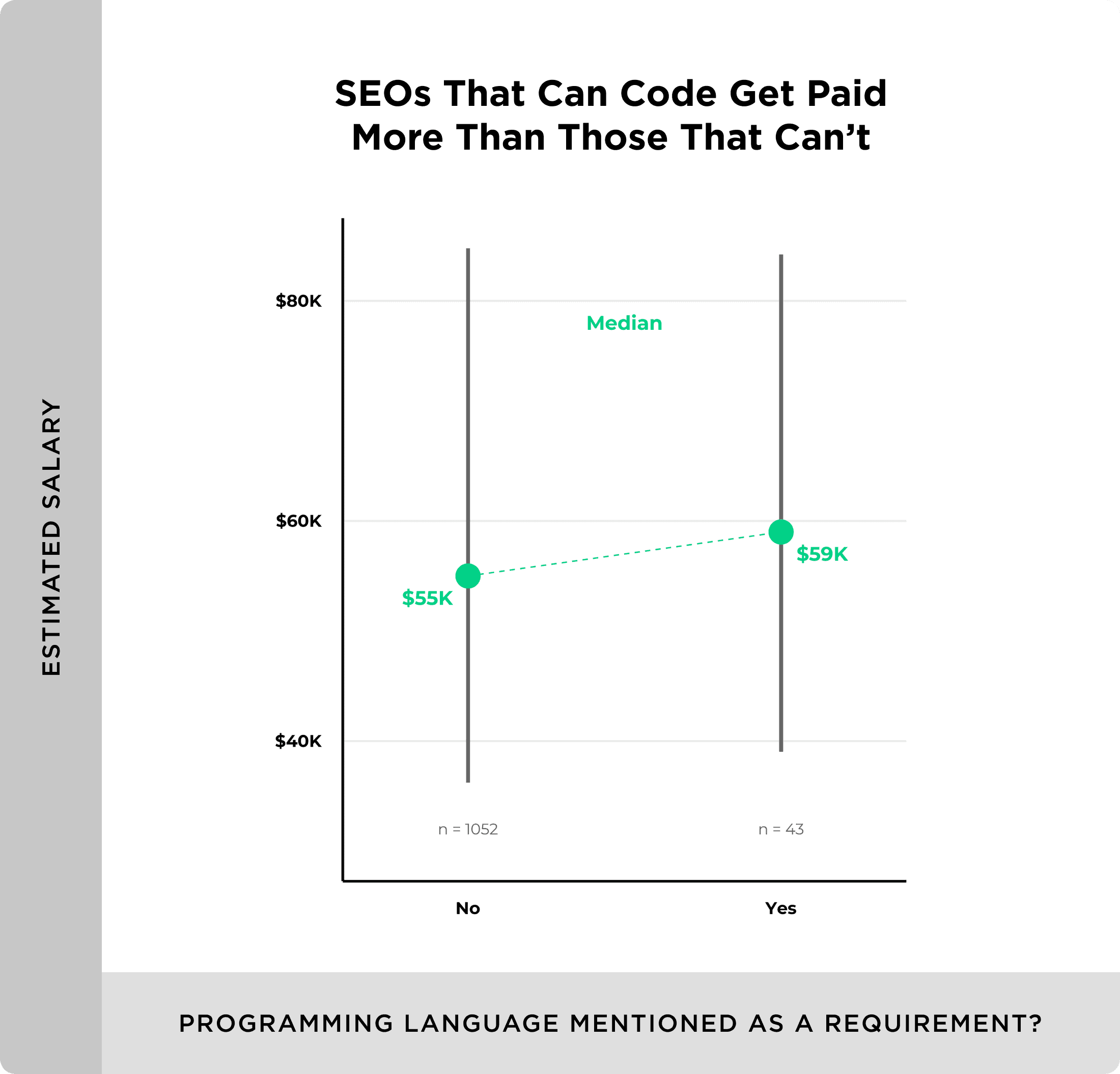
Which suggests that SEO professionals should invest in their coding skills.
For example, take a look at this job posting from our data set.
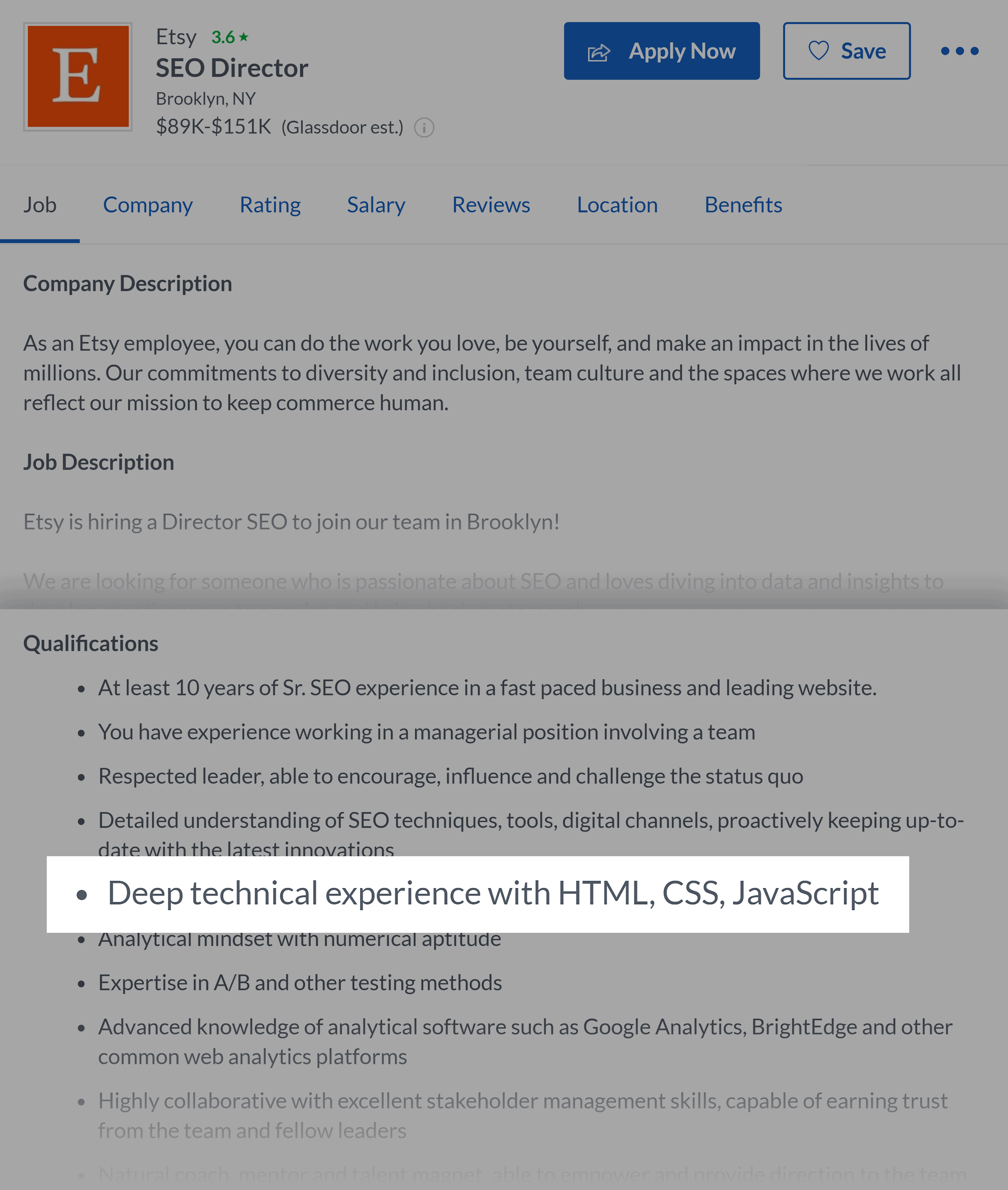
This job requires “Deep technical experience with HTML, CSS, JavaScript”. And the salary for that position is $120k, which is significantly higher than the $71.6k average SEO job salary for that state.
The Most Popular SEO Job Post Titles Are “Senior SEO Manager”, “Head of SEO”, and “SEO Content Writer”
Next, we decided to analyze the words and phrases that employers use to describe SEO positions.
This is important for two main reasons:
First, SEOs looking for a job can optimize their LinkedIn profiles for the specific terms that recruiters look for. This will not only help people find them. But prospective employers will also likely consider them a better fit for the position if their LinkedIn profile is a 1:1 match for the job title they’re looking for.
Second, these words and phrases can help SEO professionals know where to upskill. For example, knowing that many SEO titles use the term “manager” could help you focus on improving your managerial skills.
To help us find the most common terms used, we tokenized job titles into single words. And visualized their relative frequency.
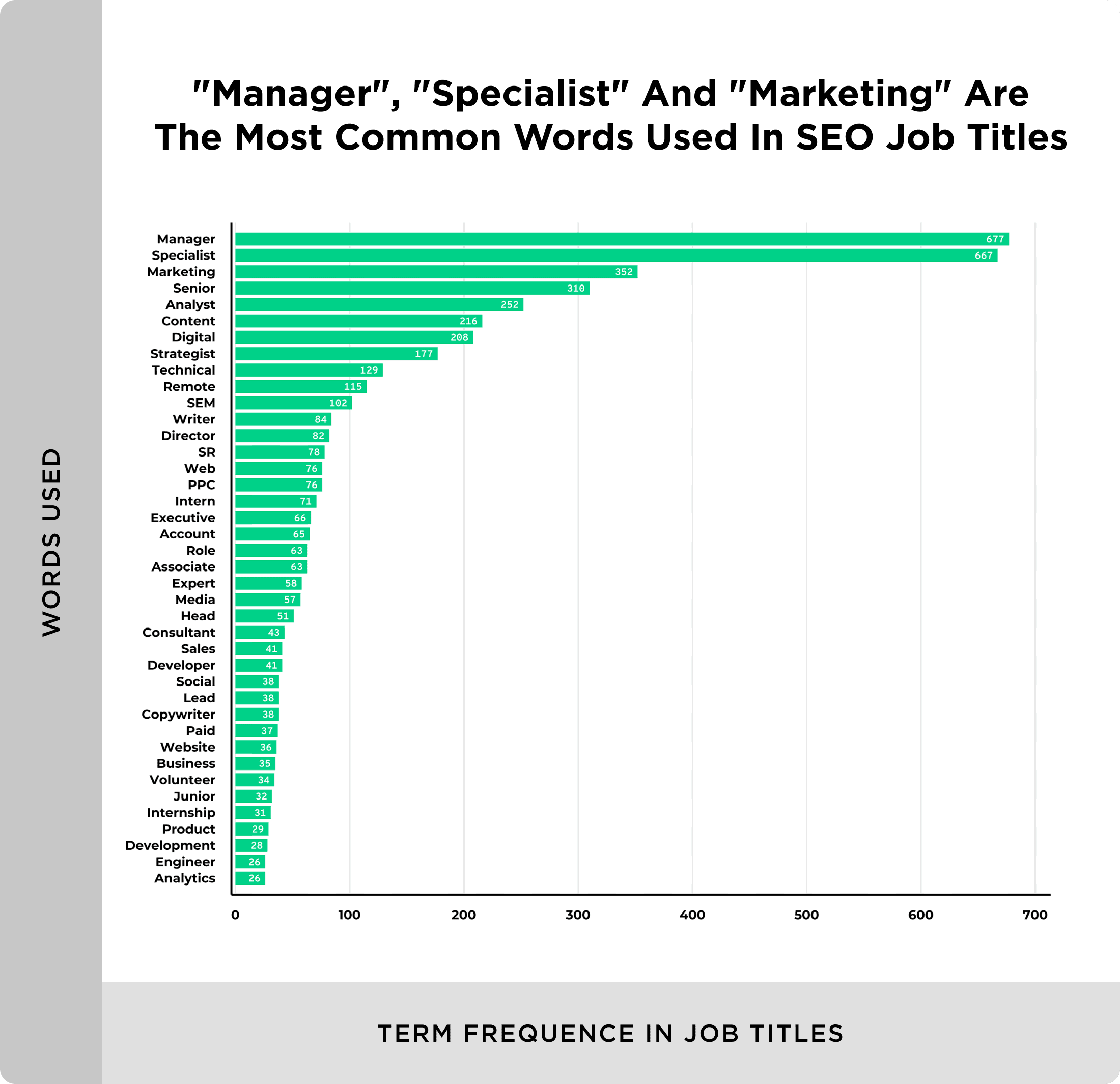
(Note: stop words and words that appeared less than 7 times were removed).
As you can see, the most common single words used In SEO job titles are “Manager”, “Specialist” and “Marketing”.
In a second step, we analyzed sequences of words in our dataset of job titles.
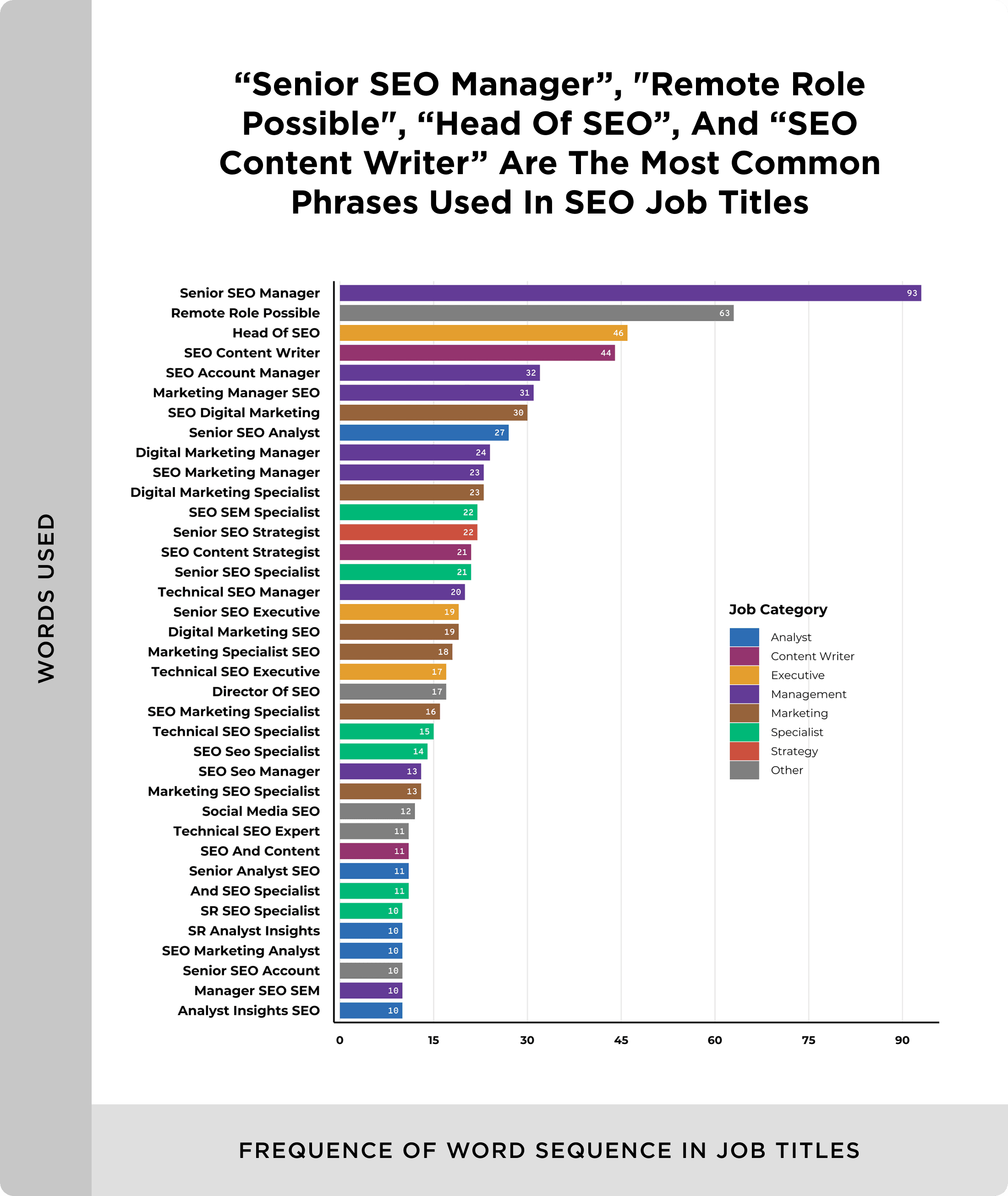
This analysis revealed that employers are posting jobs that include phrases like “Senior SEO manager”, “Head of SEO”, and “SEO Content writer”.
We also discovered that, based on the fact that the second most common phrase was “remote work possible”, that a large number of SEO roles are remote. Not surprisingly, mentions of this specific phrase seemed to increase after COVID.
Only 22.9% of SEO Jobs Emphasize Technical Skills
Is SEO a highly-technical job that involves crawling, indexing and deep knowledge of canonical tags?
Or is it more of a soft skill that’s more about content, copywriting and social media?
It’s really a mix of both.
Which is why we wanted to figure out the type of SEO positions that recruiters look for most often: technical SEO positions? Or SEO roles that focus more on non-technical skills?
Here’s what we discovered:
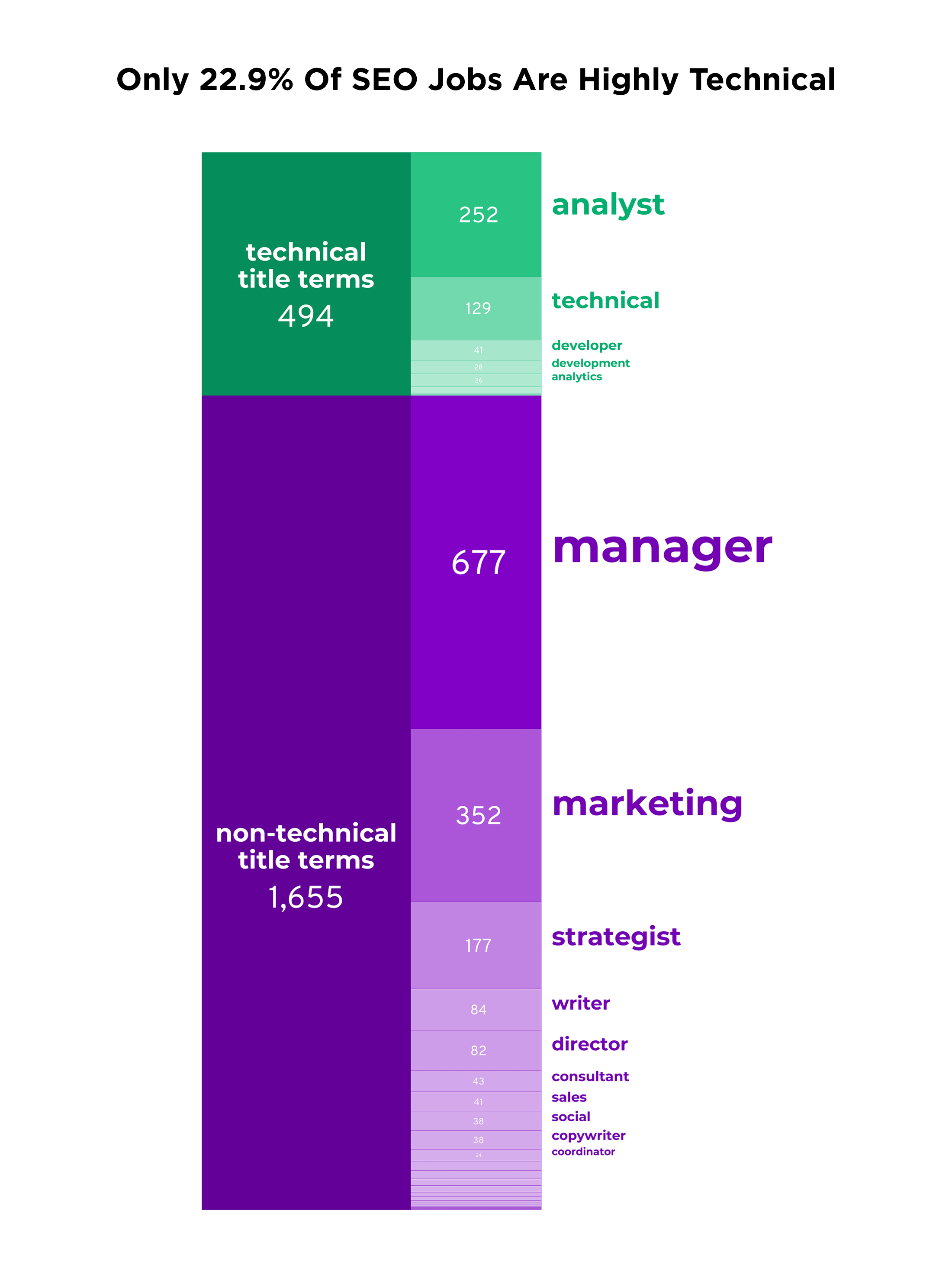
77.1% of SEO job titles include non-technical descriptions, like “manager” and “marketing”.
While only 22.9% of job titles in the SEO field included technical terms, like “technical” and “analytics”.
(Although, as I mentioned earlier, SEOs with coding skills get paid more. So that’s important to keep in mind here. Just because a title is more common doesn’t mean that it’s necessarily more desirable).
In short: most SEO positions are for non-technical positions that emphasize non-technical skills like “strategist”, “manager”, and “writer”.
We also looked at the terms used in job descriptions. Here’s a word cloud of terms that employers use in job descriptions when hiring SEO professionals.
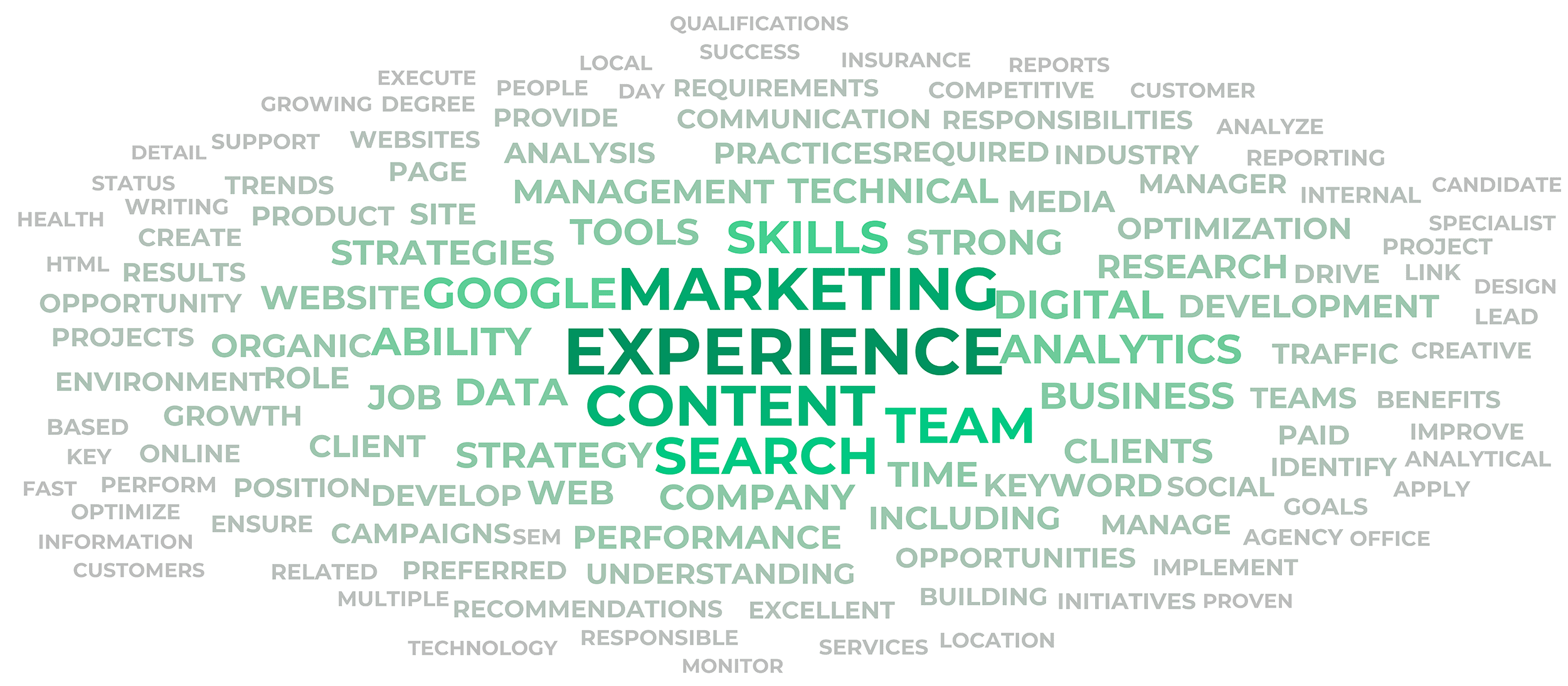
Companies Based In New York, San Francisco, Austin and Chicago Have the Highest Number of Job Offers in the SEO Industry
We analyzed our database of SEO job postings by city and state.
First, we found that these US cities had the highest number of jobs for SEO professionals.
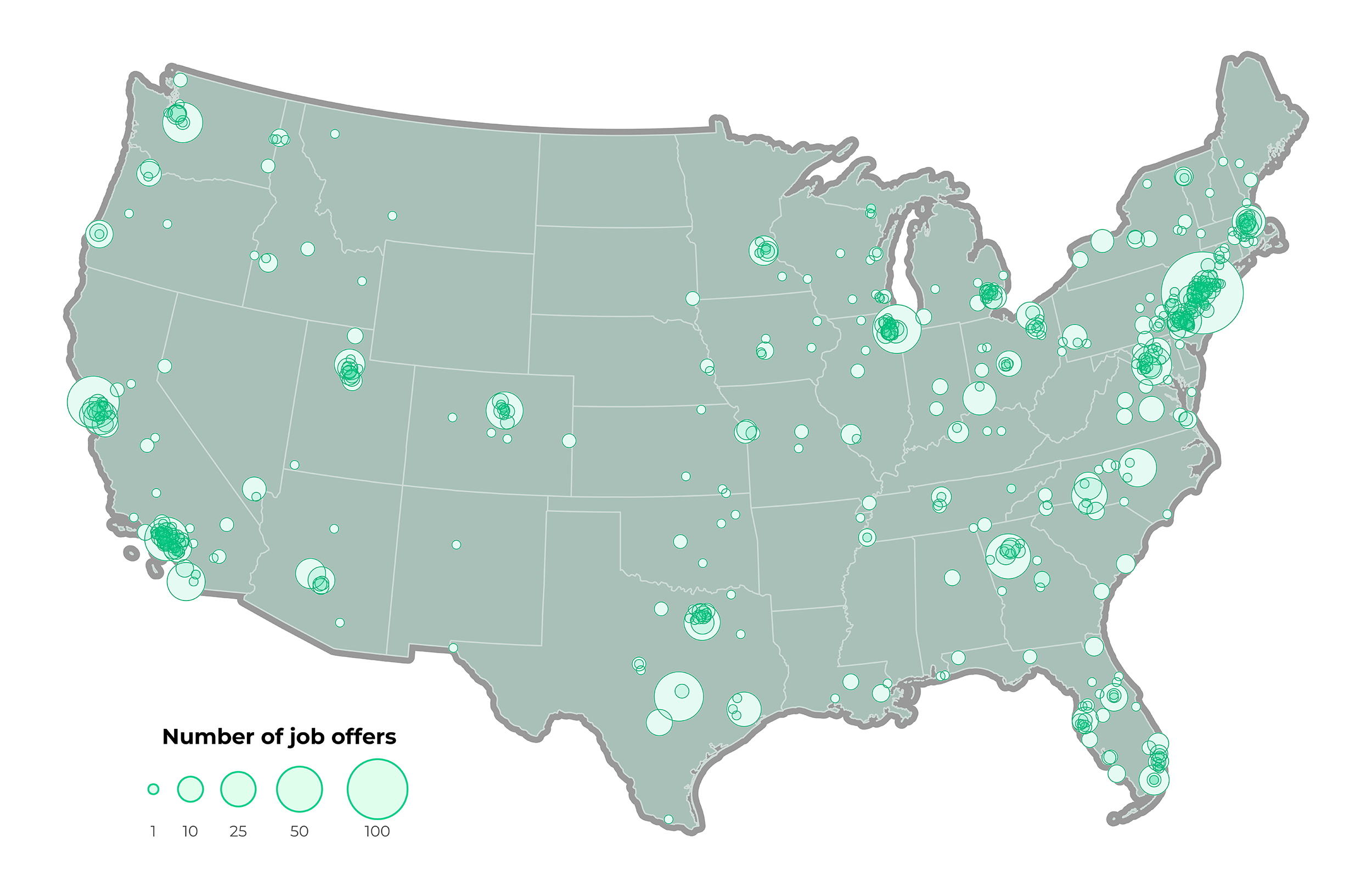
Here’s a detailed breakdown of this data.
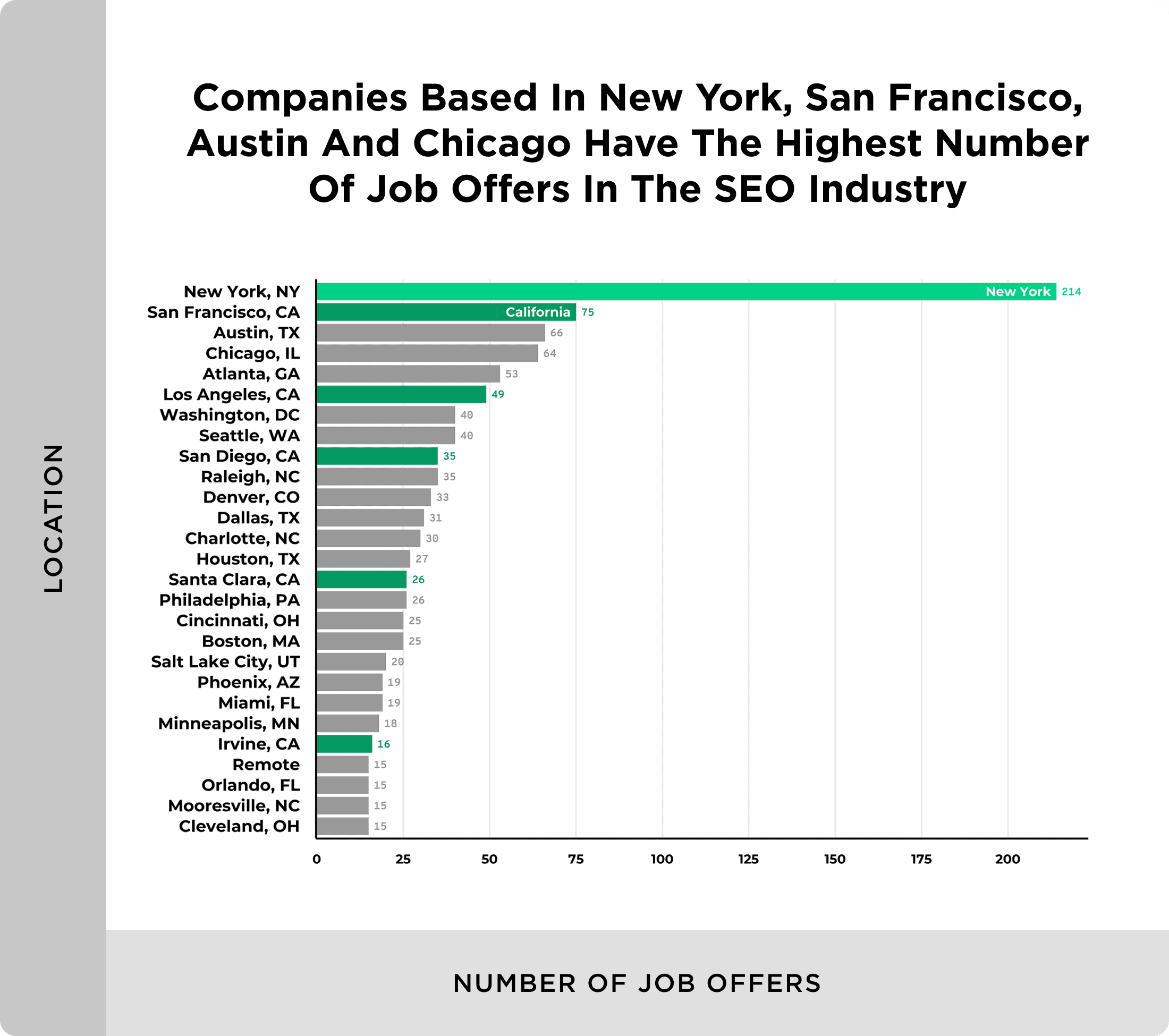
We also looked at SEO job postings by state. US states with a large number of postings for SEO positions include California, New York, Texas, Florida, Illinois, and North Carolina.
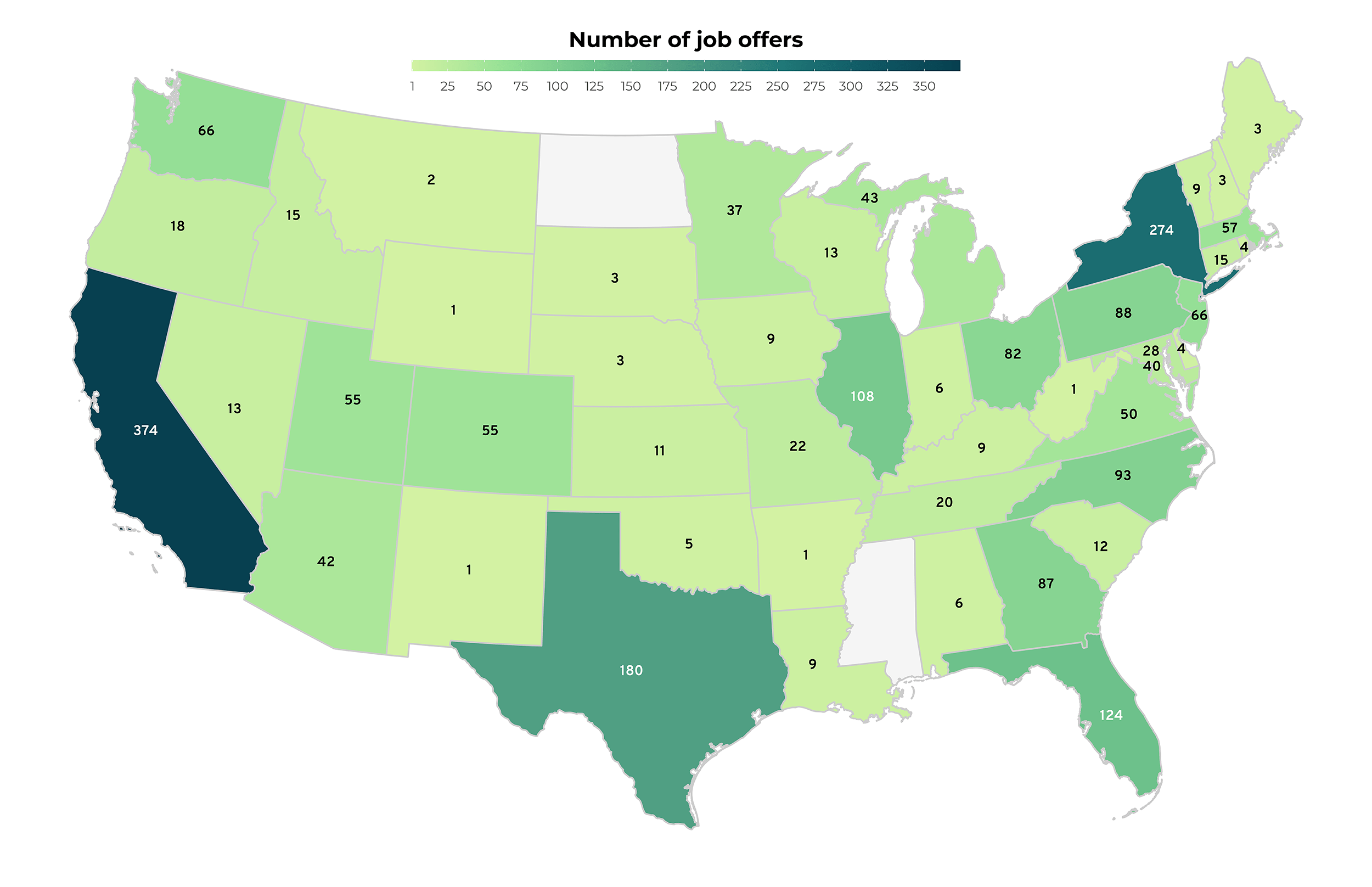
Industries With The Highest Number of SEO Job Postings Include Advertising & Marketing, Staffing & Outsourcing and IT
We decided to break down SEO job postings by sector and industry.
Specifically, we wanted to answer the question: which industries hire SEO talent the most?
First, we analyzed the number of SEO job postings by sector.
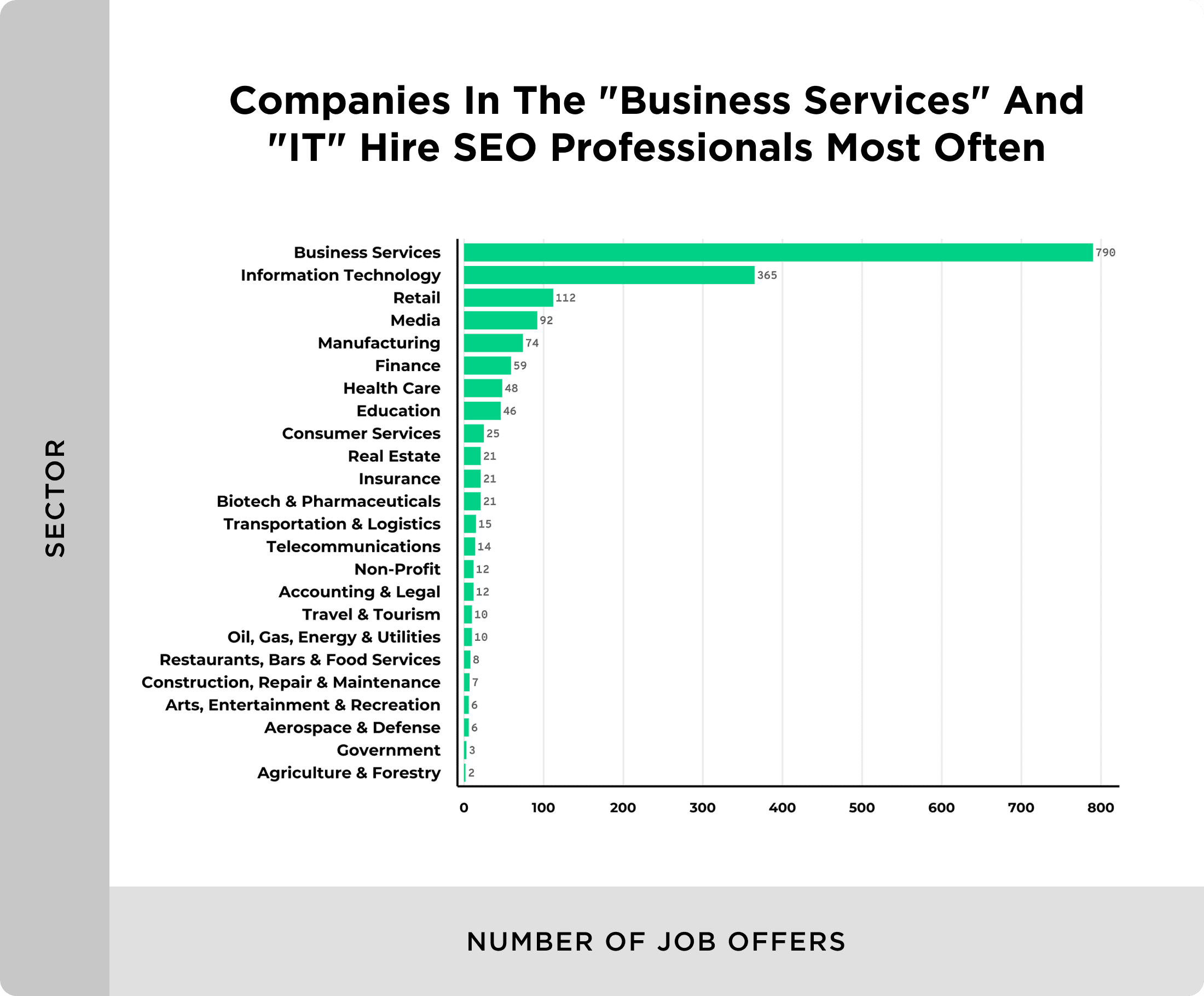
Business services and IT are the two sectors that hire for SEO help most often. This finding probably won’t surprise anyone in the SEO industry.
After all, US businesses spent approximately $700B on marketing services, according to industry research by Borrell Associates. And all of those digital marketing agencies need SEO staff to serve clients.
We also decided to look at the number of SEO positions posted by industry. Here’s what we discovered.
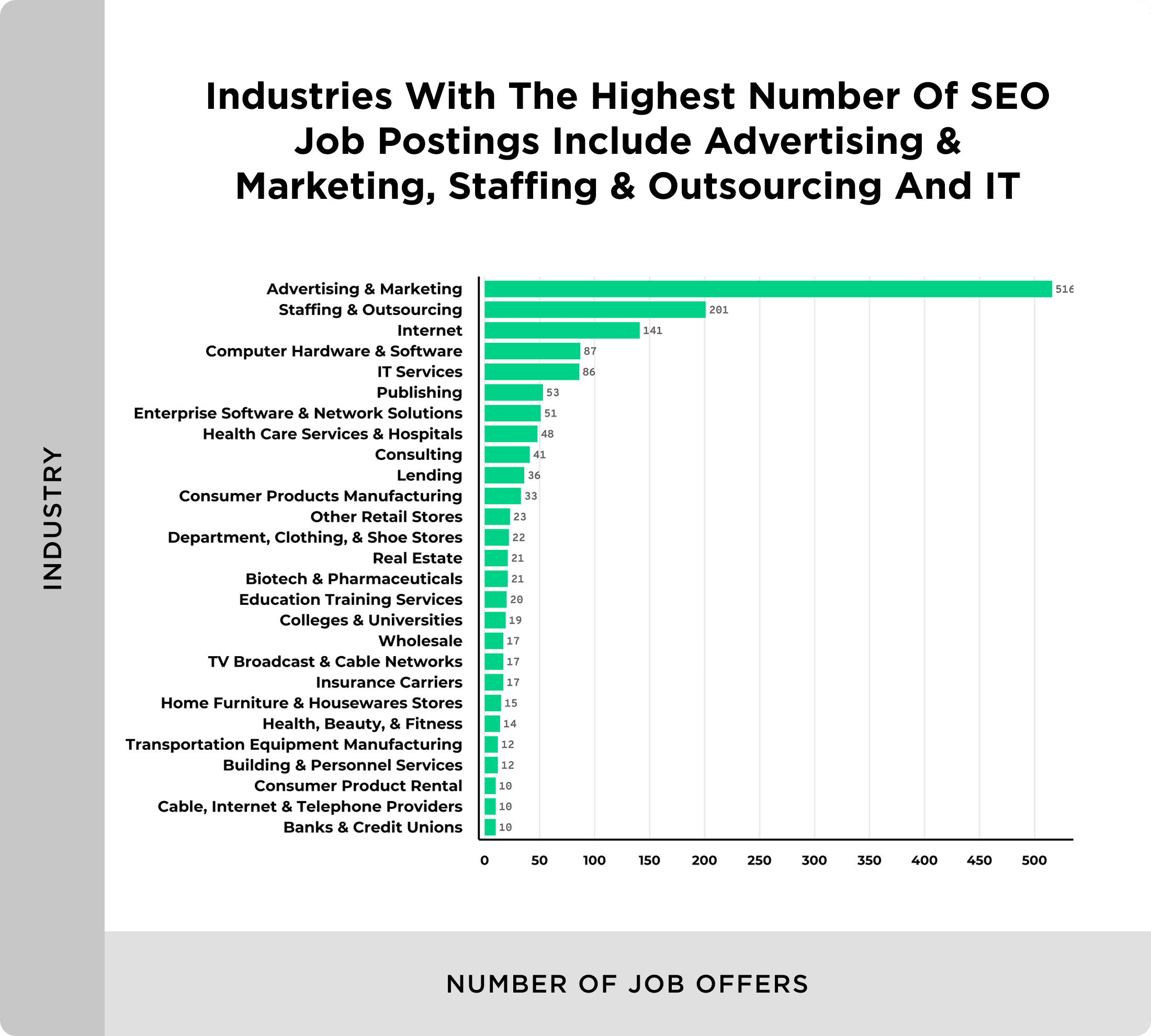
Again, no big surprises here. Advertising and marketing businesses are by far the leaders when it comes to hiring SEO professionals. You also have industries that tend to do well with or without SEO (like banks) hiring relatively little in the way of SEO help.
64.3% of SEO Positions Don’t Require a College Degree
Does a college degree help you land a competitive SEO position?
According to our data, not necessarily.
We found that 64.3% of all SEO positions have no degree requirement at all.
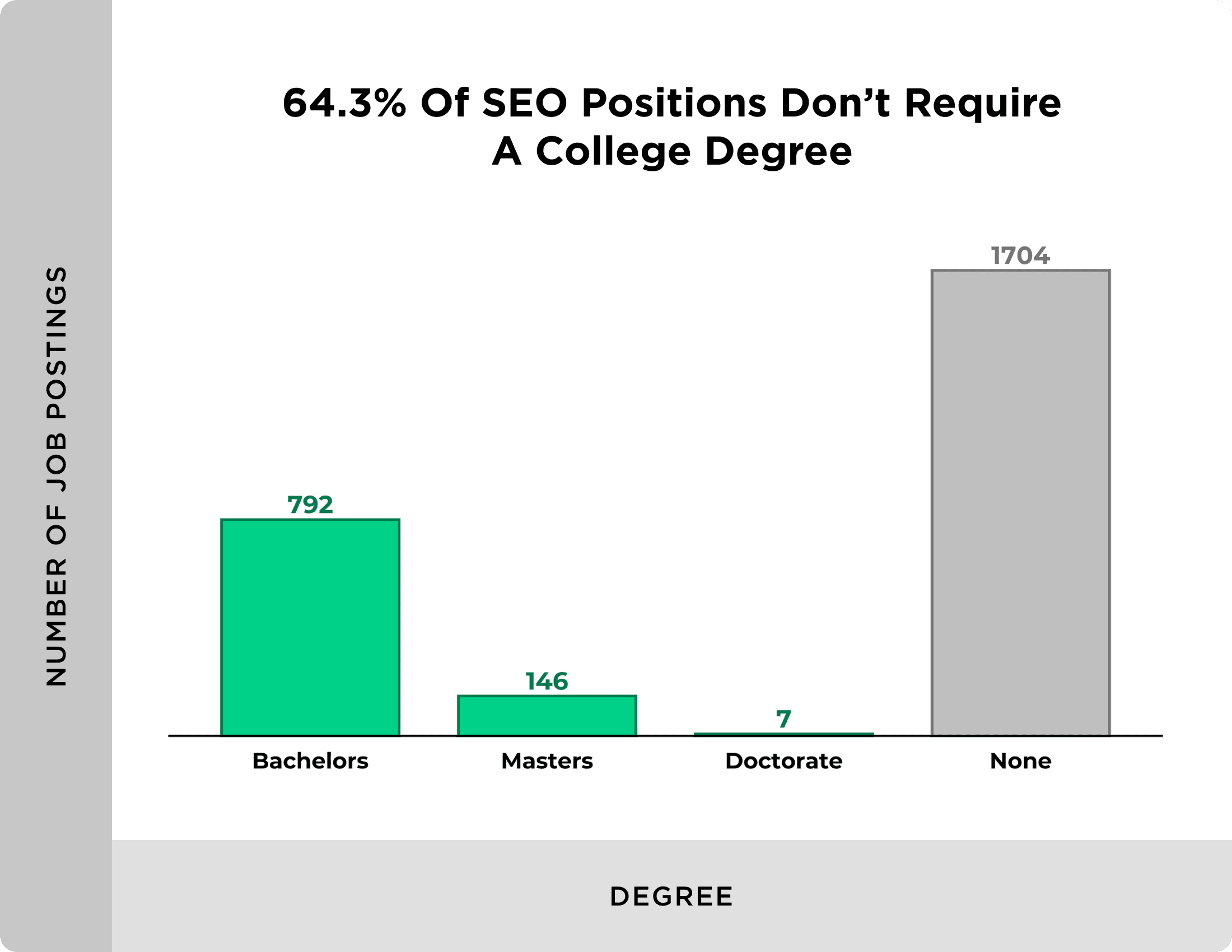
However, a fair number of SEO job postings (29.8%) did require a bachelor’s degree of some kind. Very few looked for candidates with advanced degrees.
For example, take this posting from our data set.
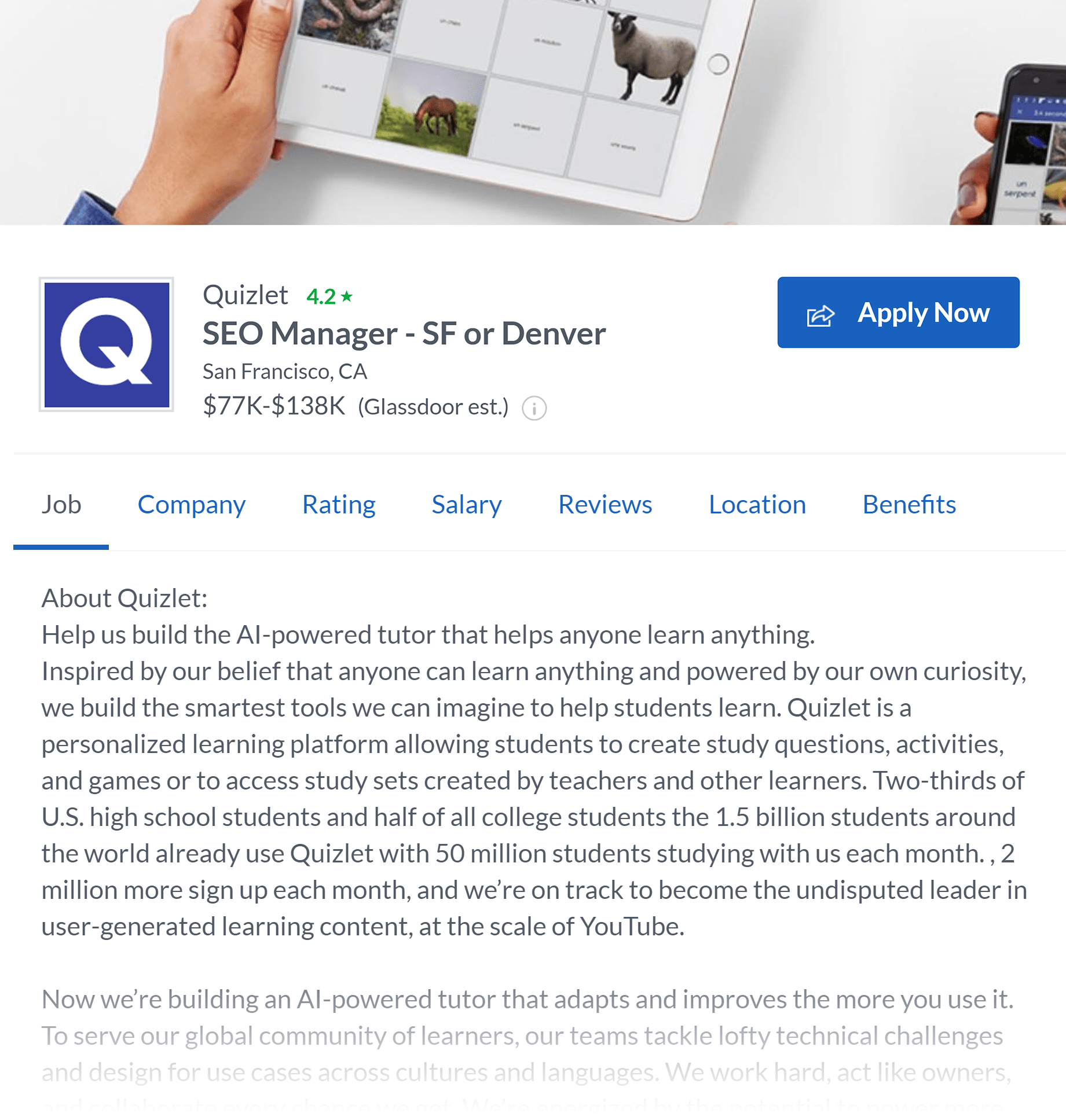
This is a relatively high-paying managerial role. Yet the position doesn’t require a bachelor’s degree.
That said, if you’re looking for a job in SEO, a bachelor’s or master’s degree isn’t going to hurt you.
But it’s clear that search engine optimization is such a fast-changing field. Which is why most employers aren’t super interested in candidates that learned SEO from a university. Instead, they prefer candidates with lots of hands-on experience from optimizing sites in the real world.
The Most In-Demand Programming Languages In SEO Are HTML, CSS, JavaScript, Go, SQL and PHP
As we covered earlier, only a small fraction (22.9%) of SEO job postings are for technical SEO positions. And that technical-focused SEO positions tend to pay more.
Which is why we wanted to dig a bit deeper into what specific technical skills employers look for in an SEO pro. And what coding languages they want candidates to have experience with.
Here’s what we found.
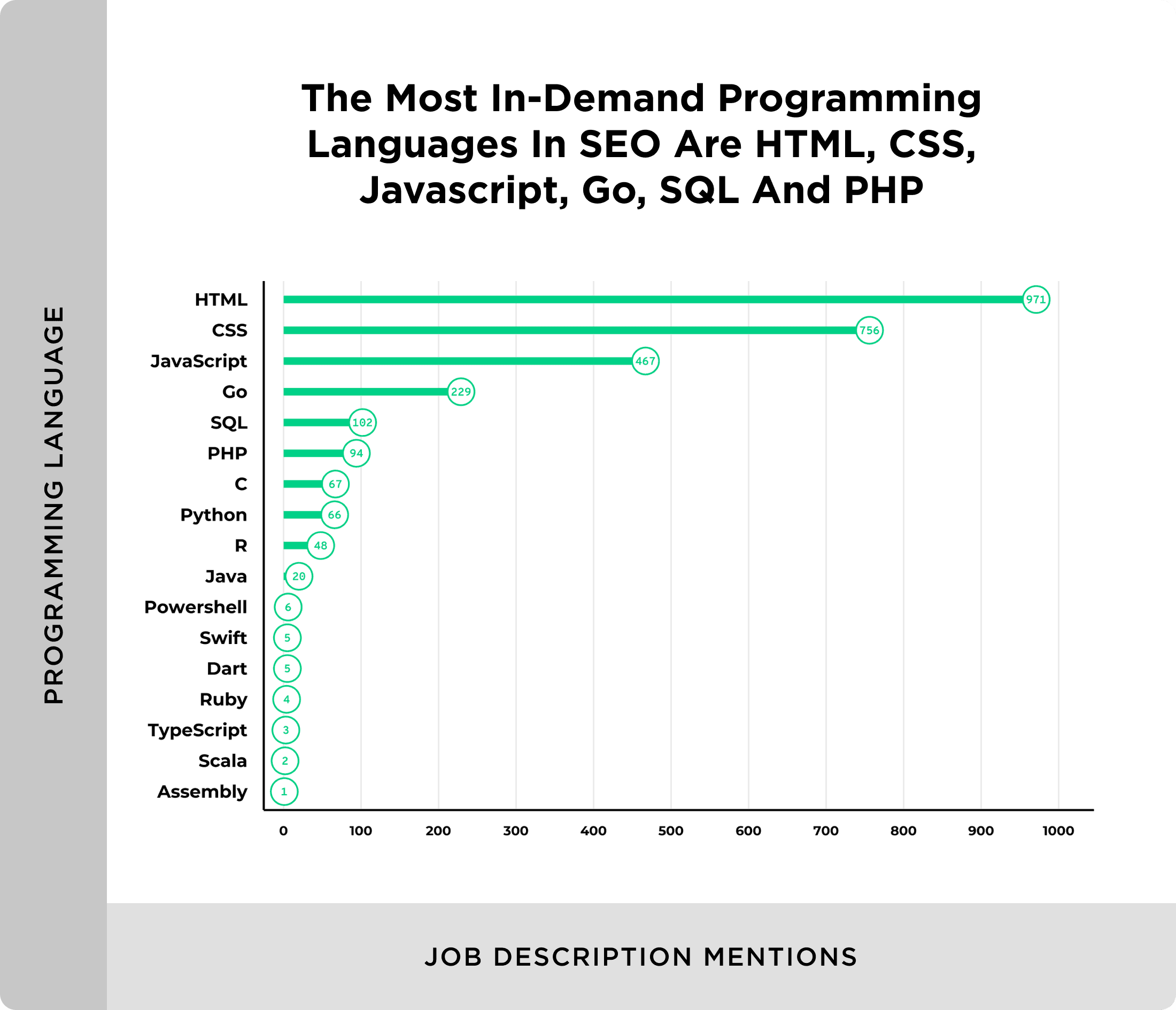
Considering that HTML and CSS are essentially the building blocks of developing websites and web apps, it makes sense that these two skills would come out on top. And when you keep in mind that 96.2% of all websites online use JavaScript, it also makes sense that employers would seek out technical SEO professionals that know JS.
We also looked at the combination of languages that businesses hired for when looking to fill SEO roles.
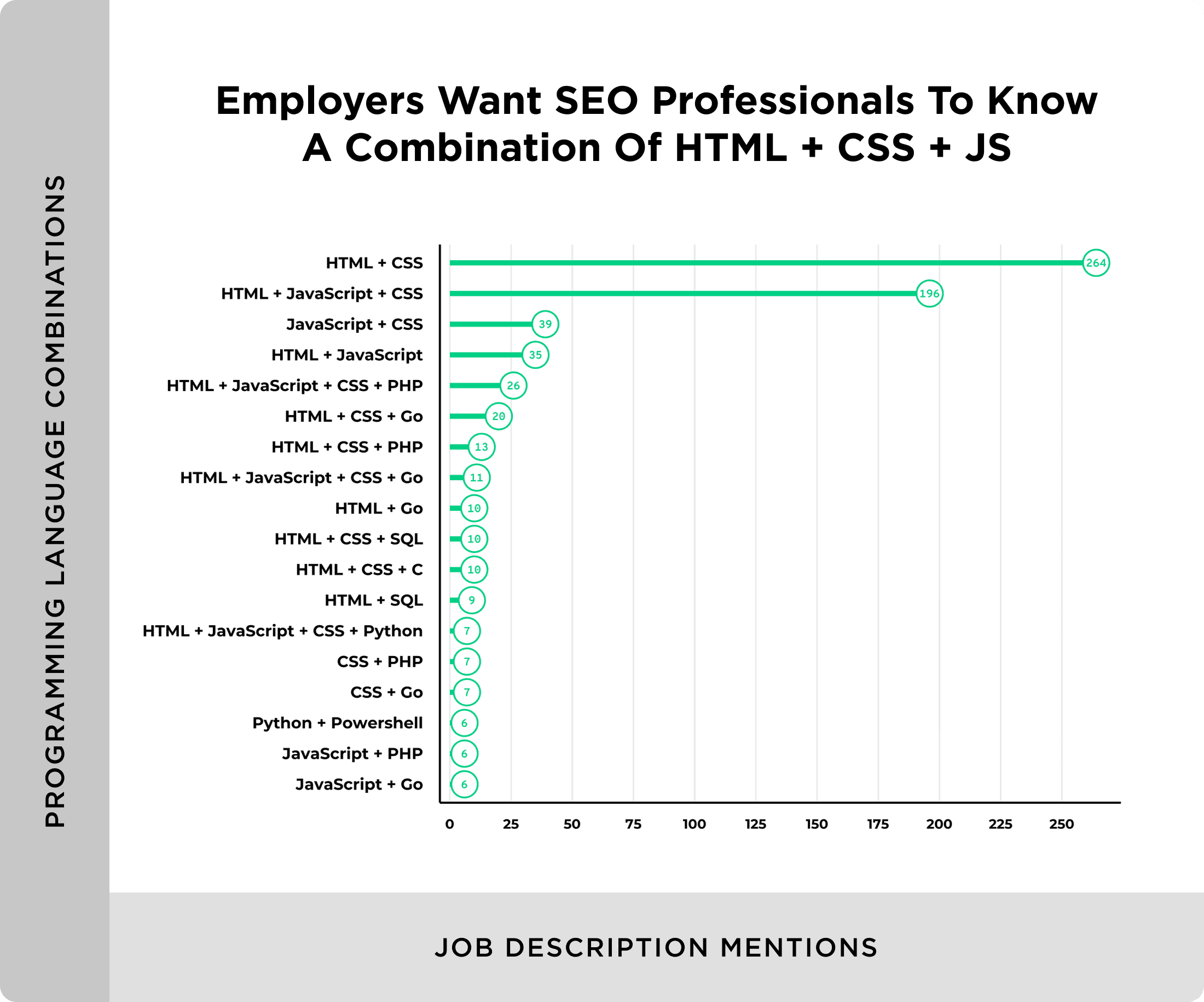
This was essentially a remix of the above findings. HTML again dominates the list. CSS and JS are also in high demand.
The COVID-19 Pandemic Didn’t Seem to Negatively Impact The SEO Industry
Mass shutdowns in response to COVID-19 led to millions of people filing for unemployment.
We hypothesized that job postings for SEO professionals may significantly slow during and after the most intense period of the COVID-19 pandemic.
However, the data shows that businesses were still hiring SEO professionals during the pandemic. A trend that has continued even as shutdowns in many states were lifted in late May and early June.
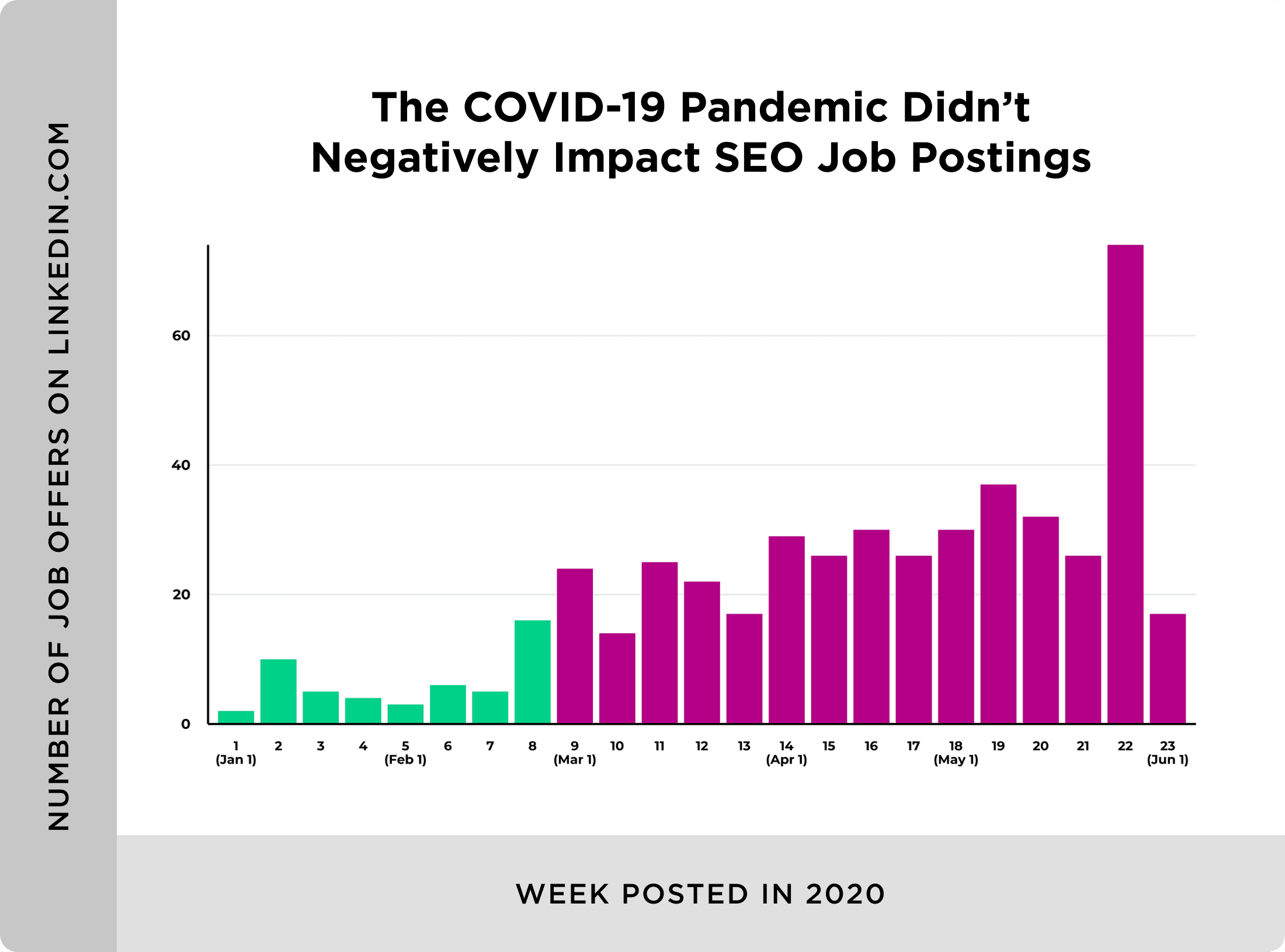
For this analysis we divided a timeline as “before” and “after” COVID. We considered “after” COVID the day that the number of COVID-19 infections hit 100 in the US. And we looked at SEO-focused job postings on LinkedIn during that time frame.
Although the US economy took a hit during COVID, it appears that the SEO industry may have gone unscathed. In fact, job postings have significantly increased.
On further analysis, this finding makes sense. Shutdowns forced many businesses to go online for the first time. Or to scale up their existing online presence. Which may have led businesses to realize that they need to hire SEO help to succeed online.
Most SEO Positions Require 2-5 Years of Experience
Next, we looked at the length of experience that SEO positions required.
Here’s the breakdown:
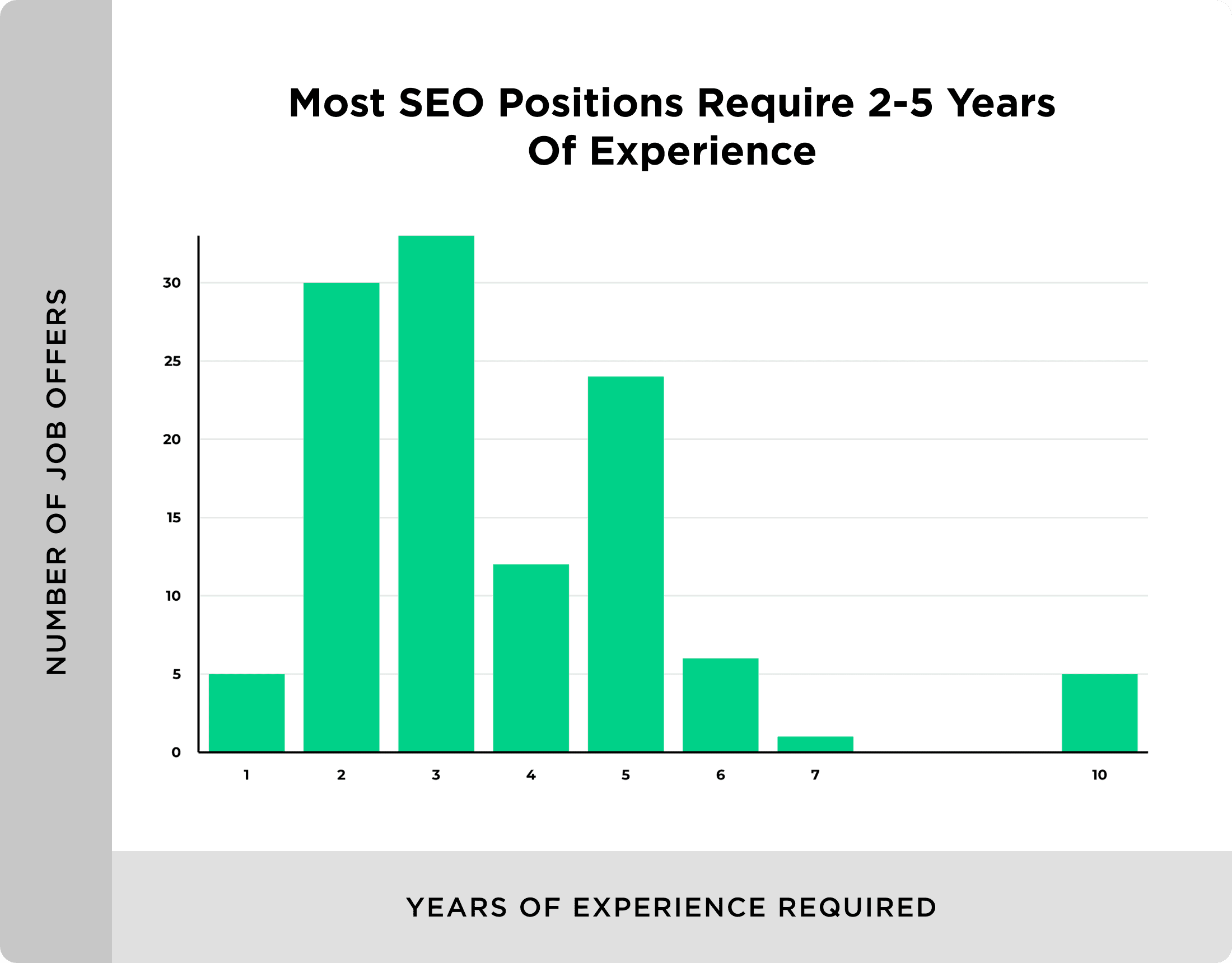
As you can see, many SEO jobs require between 2 and 5 years of experience in the field.
This is likely due to the fact that the SEO field is relatively new. There simply aren’t many candidates out there with 10+ years of SEO experience.
There’s also the question of how valuable a certain number of years of experience is in the world of SEO. SEO, like coding, is a performance-based type of role.
Having years of experience is nice to have. However, most employers want SEO professionals that can help them rank higher in Google. Whether that ability comes from 1 year or 10 years of experience doesn’t seem to matter much in the eyes of most employers.
36.6% of SEO Positions Cite Experience With a Specific SEO Tool
Most SEO professionals use a number of tools as part of their job.
We were curious to see how many job postings require experience with a specific piece of SEO software. And which tools were cited most often.
Firstly, we found that 63.4% of SEO job postings require candidates to have first-hand experience with a piece of SEO software.
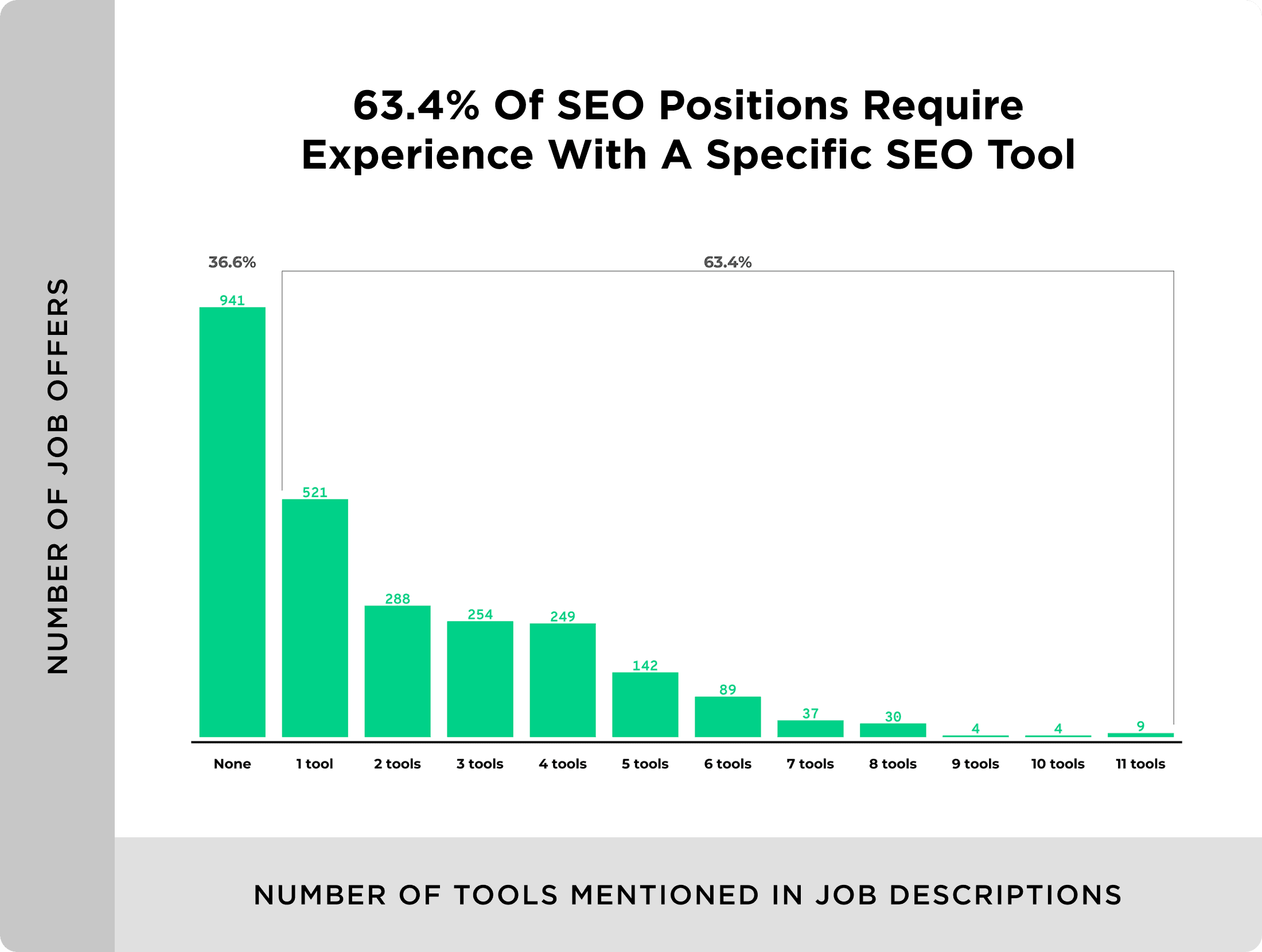
This doesn’t necessarily mean that the other roles won’t involve using an SEO tool. They likely will. It’s just that a certain percentage of employers may be comfortable training new hires on the tools that they use most often.
Second, we wanted to answer the question: for those postings that did require experience with a tool, which specific tool were they most interested in?
Here are the tools that employers want SEO hires to know how to use.
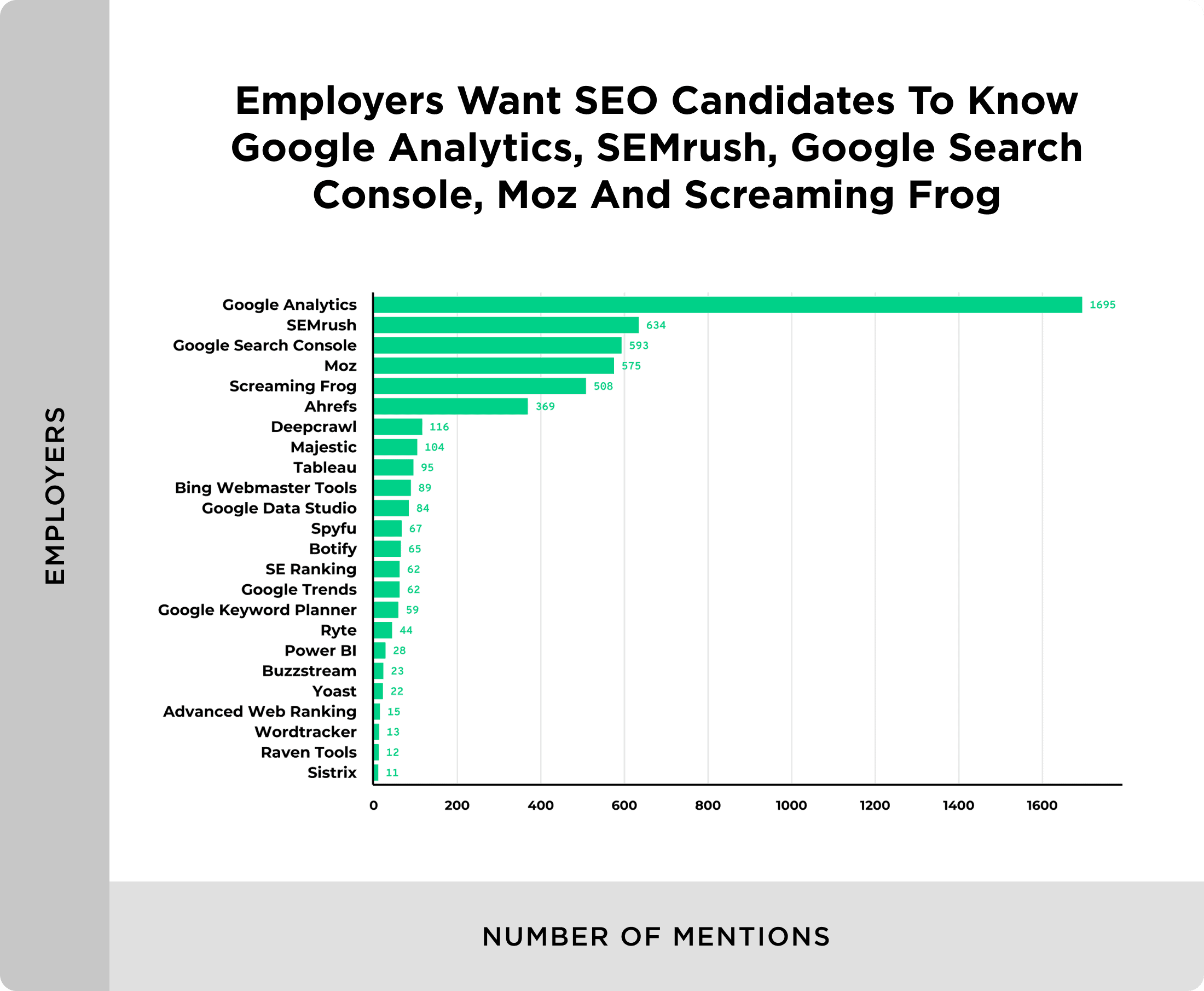
Google Analytics was (by far) the most commonly cited tool. According to BuiltWith, 85% of the top 100k websites in the world have Google Analytics installed. And considering that Google Analytics is a key tool for doing SEO-related work, it makes sense that it would come out at the top of this list.
The rest of the top 5 were a mix of paid and free tools that are 100% dedicated to SEO and SEM: Semrush, Google Search Console, Moz Pro, and Screaming Frog.
Conclusion
I really hope you enjoyed this report. You can see a full breakdown of our data analysis right here. We also have a GitHub repository of the data that we used.
Backlinko is owned by Semrush. We’re still obsessed with bringing you world-class SEO insights, backed by hands-on experience. Unless otherwise noted, this content was written by either an employee or paid contractor of Semrush Inc.